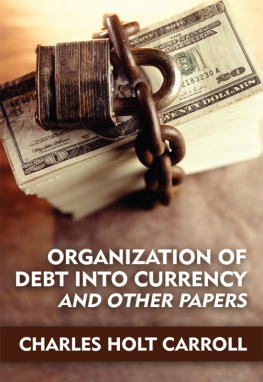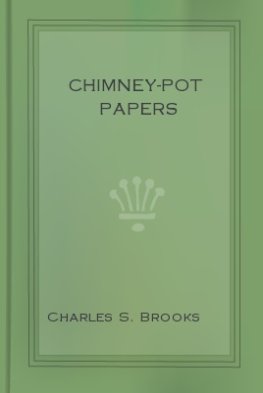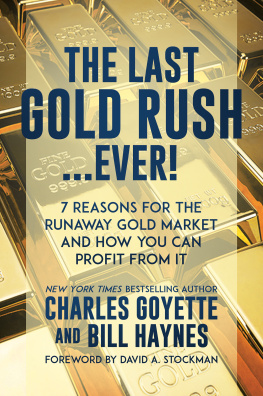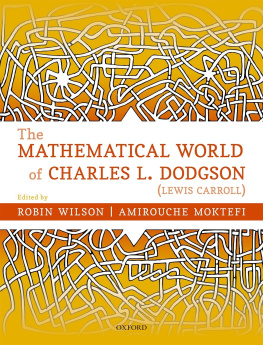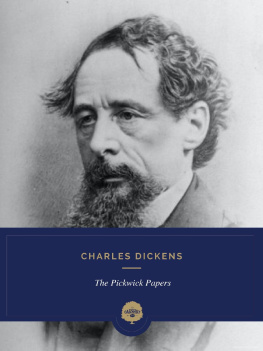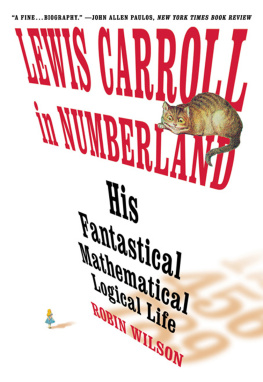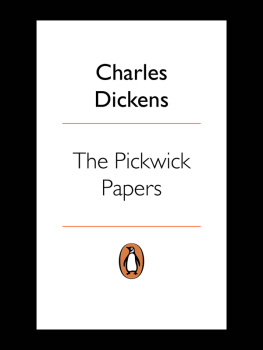Charles Holt Carroll - Organization of debt into currency, and other papers
Here you can read online Charles Holt Carroll - Organization of debt into currency, and other papers full text of the book (entire story) in english for free. Download pdf and epub, get meaning, cover and reviews about this ebook. year: 1972, publisher: Arno Press, genre: Science. Description of the work, (preface) as well as reviews are available. Best literature library LitArk.com created for fans of good reading and offers a wide selection of genres:
Romance novel
Science fiction
Adventure
Detective
Science
History
Home and family
Prose
Art
Politics
Computer
Non-fiction
Religion
Business
Children
Humor
Choose a favorite category and find really read worthwhile books. Enjoy immersion in the world of imagination, feel the emotions of the characters or learn something new for yourself, make an fascinating discovery.
- Book:Organization of debt into currency, and other papers
- Author:
- Publisher:Arno Press
- Genre:
- Year:1972
- Rating:4 / 5
- Favourites:Add to favourites
- Your mark:
- 80
- 1
- 2
- 3
- 4
- 5
Organization of debt into currency, and other papers: summary, description and annotation
We offer to read an annotation, description, summary or preface (depends on what the author of the book "Organization of debt into currency, and other papers" wrote himself). If you haven't found the necessary information about the book — write in the comments, we will try to find it.
Organization of debt into currency, and other papers — read online for free the complete book (whole text) full work
Below is the text of the book, divided by pages. System saving the place of the last page read, allows you to conveniently read the book "Organization of debt into currency, and other papers" online for free, without having to search again every time where you left off. Put a bookmark, and you can go to the page where you finished reading at any time.
Font size:
Interval:
Bookmark:

Organization of Debt into
CURRENCY
and OTHER PAPERS

CHARLES HOLT CARROLL

Arno Press & The New York Times
New York 1972

Reprint Edition 1972 by Arno Press Inc.
Copyright 1964 by William Volker Fund
Reprinted by permission of Van Nostrand Reinhold Co.
Reprinted from a copy in The Princeton University Library
LC# 70-172207
ISBN 0-405-00418-4
The Right Wing Individualist Tradition in America
ISBN for complete set: 0-405-00410-9
See last pages of this volume for titles.
Manufactured in the United States of America
Organization of Debt into Currency
and Other Papers
Organization of Debt into CURRENCY
and OTHER PAPERS

CHARLES HOLT CARROLL
Edited with an Introduction
by
EDWARD C. SIMMONS

D. VAN NOSTRAND COMPANY, INC.
PRINCETON, NEW JERSEY
Toronto New York London

D. VAN NOSTRAND COMPANY, INC.
120 Alexander St., Princeton, New Jersey (Principal office)
24 West 40 Street, New York 18, New York
D. VAN NOSTRAND COMPANY (Canada) LTD.
358, Kensington High Street, London, W.14, England
D. VAN NOSTRAND COMPANY, LTD.
25 Hollinger Road, Toronto 16, Canada
Copyright, 1964 by
WILLIAM VOLKER FUND
Published simultaneously in Canada by
D. VAN NOSTRAND COMPANY (Canada), LTD.
No reproduction in any form of this book, in whole or in part (except for brief quotation in critical articles or reviews), may be made without written authorization from the publishers.
PRINTED IN THE UNITED STATES OF AMERICA
Little is known of Charles Holt Carroll (1799-1890), the author of the thirty-six essays reprinted in this book. In the list of contributors in Hunts Merchants Magazine, where many of these essays appeared, Carroll is described as A Merchant of Massachusetts. There are, of course, such scattered bits of information in business directories and newspapers as may be found for many nineteenth-century businessmen, but even when these are combined with the remarks he drops about himself in his essays, only a shadowy figure of a man emerges. One would like to know more about this merchant who wrote so vigorously on the currency question.
Carroll seems to have had no close associates. Possibly he was regarded as eccentric. In any event no one troubled to write his biography, and the members of his family did not bother to preserve his personal papers. Despite his claim to having discovered no less than three new truths as to the effects of paper money in an essay written in 1859, those around him evidently did not think he would achieve renown. It now appears that Carroll might have made broader claims, for in the aggregate his writings contain an abundance of interesting ideas.
Although Carroll insists upon a fresh approach to the currency problem, he is emphatic that his findings are based on accepted economic doctrine. He pauses frequently to praise the developing science of political economy, whose laws he insists are universally valid. He appears to have been a moderately careful student of Smith and Mill, and he was strongly, if not violently, anti-interventionist and antiprotectionist. On currency matters he was not a slavish follower of classical thought. Rather, he pursued his own path, rejecting, for example, Smiths dictum that an economy is realized by substituting paper money for the precious metals. He also quarrels with Mills view that all forms of credit have the same effect. Yet in fundamental matters, such as the nature and source of value, Carroll adheres to orthodox teaching. Carrolls outright rejection of the ideas of Henry C. Carey is indicative of his basic approach.
There were, to be sure, other antibank and hard-money men in the middle of the nineteenth century, but, unlike some, Carroll was not content simply to repeat the slogans of the antibank faction of the Jacksonian era. He undertook to provide a reasoned argument for opposing banks, using the doctrines of the political economists; and while others had attempted to supply such a rationale, Carroll was possibly the most able. His analysis of a fractional-reserve banking system contains penetrating insights; and although the economic scene has changed, much of what he has to say is still pertinent. Our money continues to be that same debt currency that Carroll abhorred. Even if one is not prepared to agree with all of his analysis or to accept any of his policy conclusions, one must admire the work of this nineteenth-century businessman who was unafraid of new ideas. The freshness of his views and the vigor of his style make these essays a pleasure to read.
An obituary in the Boston Evening Transcript of February 25, 1890, states that Charles Holt Carroll was born in Maryland in 1800 and belonged to the same family as Charles Carroll of Carrollton, signer of the Declaration of Independence. The Newton Journal of February 28, 1890, repeats this claim. In fact, however, Carroll was born October 25, 1799, in Charlestown, Massachusetts, of sturdy New England stock which can be traced back to the early 1600s. It is uncertain who fastened to Carroll this American substitute for aristocratic lineage. There is no doubt that he did live in Maryland as a young man.
Possibly he went to Baltimore as a youth, but there is no direct evidence of his presence there until 1829. A number of young men named Charles Carroll attended St. Marys College in Baltimore during the years when Carroll would have been of student age. It could hardly have been he who signed Charles H. Carroll in the Degree Book of St. Marys College, July 2, 1813. That would mean that he earned the degree of A.B. when but thirteen years old. But when Carroll remarks in one of his many diatribes against the Bank of England that it was founded by the Protestants as part of the effort to displace the Stuarts, he may be revealing that he learned his history from a Roman Catholic teacher, as he certainly would have if he had been of the Maryland Carrolls. This, however, belies the Protestant background of his parents. Nor does it harmonize with the fact that Carrolls funeral was conducted by a Unitarian clergyman. In any event, Carrolls style of writing suggests that he had been trained under firm-handed schoolmasters. His thought is clear, his ideas are well organized, and his language is forceful. There are frequent classical allusions in his essays, but there is little of the excessively flowery style of the period. Although his eldest son attended Harvard, there is no record that he himself did.
Carroll, of course, may have been self-educated. If so, this might account for his frequently expressed scorn for closeted scholars. He says that only men who have had practical experience are qualified to speak on the question of the currency. One cannot be sure what meaning attaches to the aspersions he casts on scholarly deduction. While he does insist on first-hand knowledge of currency matters, he does not deny himself acquaintance with the writings of the political economists. At every opportunity he bolsters his views by appealing to their authority, although he does not hesitate to challenge them on doctrinal points.
Font size:
Interval:
Bookmark:
Similar books «Organization of debt into currency, and other papers»
Look at similar books to Organization of debt into currency, and other papers. We have selected literature similar in name and meaning in the hope of providing readers with more options to find new, interesting, not yet read works.
Discussion, reviews of the book Organization of debt into currency, and other papers and just readers' own opinions. Leave your comments, write what you think about the work, its meaning or the main characters. Specify what exactly you liked and what you didn't like, and why you think so.

